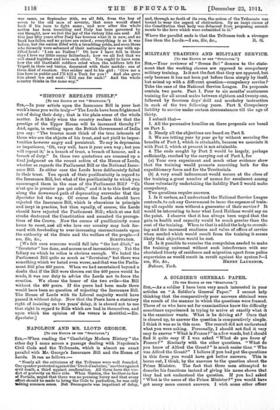MILITARY TRAINING AND MILITARY SERVICE.
[To THE Evrron OF THE "SrEctreron,"1
Sus,—Your reviewer of " Seems Sol " demurs to the state- ment that the working classes are opposed to compulsory military training. Is it not the fact that they are opposed, but only because it has not been put before them simply by itself, but mixed up with a different question—compulsory service P Take the case of the National Service League. Its proposals contain two parts. Part 1. Four to six months' continuous training for all sound males between eighteen and twenty-one, followed by fourteen days' drill and musketry instruction in each of the two following years. Part 2. Compulsory liability to service under certain circumstances till the age of thirty.
I submit that—.
1. All the persuasive homilies on these proposals are based on Part 1.
2. Nearly all the objections are based on Part 2.
3. We are letting year by year go by without securing the benefits of Part 1, which is attainable, because we associate it with Part 2, which at present is not attainable.
4. The ends sought by Part 2 would be largely, perhaps sufficiently, reached by the carrying out of Part 1, for (a) Your own experiment and much other evidence show that the training would promote recruiting both for the expeditionary force and for the Territorials.
(b) A very small inducement would secure at the close of the training a great number of names for enrolment among those voluntarily undertaking the liability Part 2 would make compulsory.
Two questions require answers.
I. Is it useless, as I understand the National Service League contends, to ask any Government to incur the expense of train- ing all capable men without a guarantee of their service ? It would be interesting to hear what Lord Haldane would say on the point. I observe that it has always been urged that the gain in health and capacity would be much greater than the cost of the training. When to that is added the help to recruit- ing and the increased readiness and value of offers of service when needed which would result from the training it seems likely that objection would be met.
II. Is it possible to exercise the compulsion needed to make the training universal without such interference with our cherished liberty of residence and migration apart from police supervision as would result in revolt against the system P—I Ramer, York.


































 Previous page
Previous page